Eco Tourism Lodges represent a pivotal shift in the travel industry, offering a sustainable and enriching experience for environmentally conscious travelers. SIXT.VN recognizes the growing demand for responsible travel options in Vietnam, particularly in destinations like Hanoi. By choosing eco tourism lodges, travelers can minimize their environmental impact while immersing themselves in the natural beauty and cultural heritage of Vietnam. Embrace eco-friendly accommodations, green initiatives, and eco-conscious practices for an unforgettable journey.
1. What Defines Eco Tourism?
Eco tourism is defined as a form of tourism that focuses on responsible travel to natural areas, conserving the environment, and improving the well-being of local people. According to the United Nations World Tourism Organization (UNWTO), eco tourism involves observing and appreciating nature and local cultures, incorporating educational elements, and minimizing negative impacts on the environment. Eco tourism enhances conservation efforts, provides economic benefits to local communities, and promotes awareness of cultural assets among tourists.
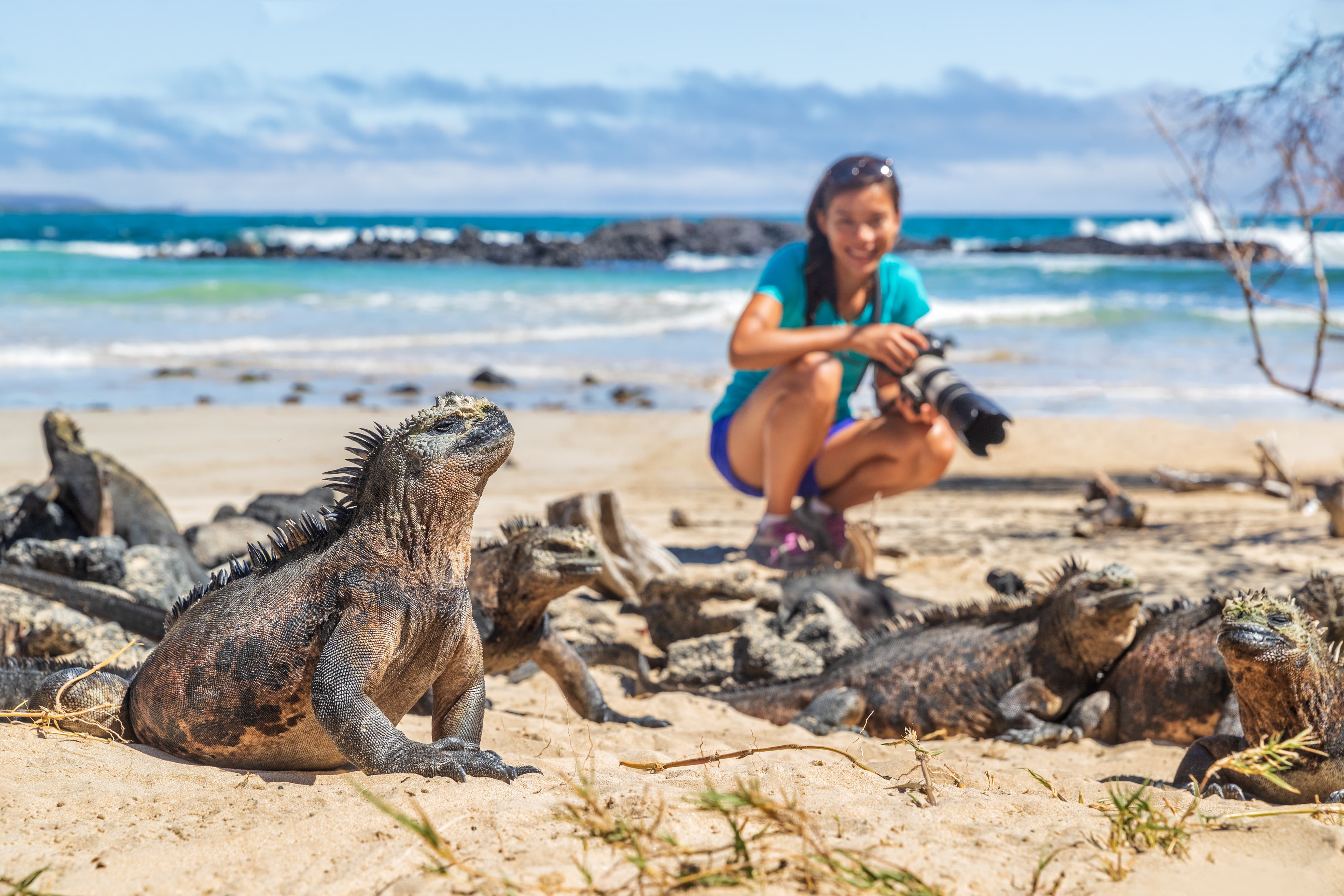 Eco Tourism at its finest
Eco Tourism at its finest
Expanding on Eco Tourism:
Eco tourism has gained traction as travelers seek more sustainable and responsible travel options. The core principles of eco tourism include:
- Nature-Based Tourism: Focusing on experiencing natural environments.
- Education and Interpretation: Providing insights into the local environment and culture.
- Small Group Tours: Organized by specialized operators to minimize impact.
- Minimizing Negative Impacts: Reducing harm to natural and socio-cultural environments.
- Supporting Conservation: Generating economic benefits for conservation efforts.
- Local Community Benefits: Offering employment and income opportunities.
- Raising Awareness: Promoting conservation among locals and tourists.
These elements ensure that tourism contributes positively to the environment and local communities.
2. What are the Key Principles of Eco Tourism?
The key principles of eco tourism are based on minimizing environmental impact, building environmental awareness, providing direct financial benefits for conservation, and respecting local cultures. According to Martha Honey, co-founder of the Center for Responsible Travel, these principles also involve providing economic benefits and power to local communities, supporting human rights, and promoting democratic movements. Eco tourism adheres to seven main principles that guide sustainable and responsible travel:
 Arabian designed room at Bab El Oued eco lodge Morocco
Arabian designed room at Bab El Oued eco lodge Morocco
Elaborating on Eco Tourism Principles:
-
Travel to Natural Areas: Emphasizes visiting natural environments like forests, mountains, and coastal regions.
-
Minimize Impact: Focuses on reducing the ecological footprint of tourism activities through responsible practices.
-
Build Environmental Awareness: Involves educating travelers and locals about the importance of conservation and sustainability.
-
Provide Direct Financial Benefits for Conservation: Ensures that tourism revenues contribute to the protection of natural resources and habitats.
-
Provide Economic Benefits and Power to Local Communities: Empowers local populations through employment, economic opportunities, and community development.
-
Respect Local Cultures: Encourages travelers to appreciate and respect the traditions, customs, and heritage of local communities.
-
Support Human Rights and Democratic Movements: Promotes ethical tourism practices that align with human rights and democratic principles.
These principles ensure that eco tourism not only preserves natural environments but also supports the well-being of local communities.
3. What Distinguishes an Eco Tourism Lodge from Regular Hotels?
An eco tourism lodge is a business that offers eco tourism experiences to minimize environmental impact while maximizing benefits to local communities. Eco tourism lodges distinguish themselves from traditional hotels by integrating sustainable practices into their design and operations. According to the World Tourism Organization (UNWTO), eco tourism lodges often feature recycling programs, waste reduction strategies, sustainable use of natural resources, and community development initiatives. Eco tourism lodges benefit local communities with employment, education, and infrastructure, while also educating guests about environmental conservation.
Deep Dive into Eco Tourism Lodge Traits:
- Recycling Programs: Eco tourism lodges implement comprehensive recycling programs to reduce waste and promote resource conservation.
- Waste Reduction: These lodges focus on minimizing waste through composting, reducing single-use plastics, and promoting reusable items.
- Sustainable Use of Natural Resources: Eco tourism lodges manage resources like water and energy efficiently, often utilizing renewable energy sources.
- Green Building Materials: Construction involves using eco-friendly materials such as bamboo, reclaimed wood, and recycled plastics.
- Community Development: Eco tourism lodges support local communities through employment, education, and infrastructure development.
- Cultural Respect: Eco tourism lodges respect local cultures and traditions, promoting cultural preservation and understanding among guests.
- Clear Environmental Guidelines: Lodges establish clear environmental guidelines for both staff and guests to ensure responsible behavior.
- Use of Non-Permanent Structures: Lodges often use non-permanent structures to minimize their impact on the environment.
- Alternative Power Sources: Utilizing solar, wind, and other renewable energy sources to reduce reliance on fossil fuels.
- Conservation Efforts: Active participation in conservation projects, such as reforestation, wildlife protection, and habitat restoration.
- Educating Guests and Locals: Providing educational programs and resources to raise awareness about environmental issues and sustainable practices.
These traits collectively make eco tourism lodges an environmentally responsible and community-focused choice for travelers.
4. How Can I Determine if a Lodge is Truly Eco-Friendly?
To determine if a lodge is truly eco-friendly, look for a sustainability policy, commitment to limiting environmental impact, local ownership, and involvement with the local community. Ask questions about sustainability policies, environmental impact reduction, local ownership, and community involvement. According to the Global Sustainable Tourism Council (GSTC), credible certifications like LEED or EarthCheck are good indicators, although smaller eco tourism lodges may face challenges in obtaining these certifications.
 Room viewLongitude 131 eco tourism lodge room view of Uluru in Australia
Room viewLongitude 131 eco tourism lodge room view of Uluru in Australia
Key Indicators of Eco-Friendliness:
- Sustainability Policy: A clear and accessible sustainability policy on the lodge’s website indicates a commitment to responsible practices.
- Environmental Impact Reduction: Evidence of efforts to minimize environmental impact, such as energy efficiency, water conservation, and waste management.
- Local Ownership: Lodges owned and operated by locals ensure that tourism revenue directly benefits the community.
- Community Involvement: Active engagement in local community projects, such as hiring local staff, sourcing local products, and supporting local businesses.
- Certifications: Certifications from reputable organizations like LEED or EarthCheck provide assurance of adherence to sustainability standards.
By evaluating these factors, travelers can make informed decisions and support eco tourism lodges that genuinely contribute to environmental conservation and community well-being.
5. What Design and Construction Elements are Common in Eco Tourism Lodges?
Common design and construction elements in eco tourism lodges include solar systems, rainwater tanks, and sustainable building materials. Eco-friendly designs focus on minimizing the lodge’s environmental footprint while maximizing energy efficiency. Sustainable building materials such as bamboo, reclaimed wood, and recycled plastics are often used.
Common Design and Construction Features:
-
Solar Systems:
- Solar power is used to provide renewable energy, reducing reliance on fossil fuels.
- Ideal for remote locations with ample sunlight, ensuring a sustainable power source.
-
Rainwater Tanks:
- Rainwater tanks collect rainwater for various uses, reducing water consumption.
- Provides a sustainable water supply for guests and operations.
-
Sustainable Building Materials:
- Eco-friendly materials like bamboo, reclaimed wood, and palm fronds are used.
- Recycled materials such as plastic and glass are incorporated to reduce waste.
These elements collectively contribute to creating sustainable and environmentally friendly eco tourism lodges.
6. What are Some Top Eco Tourism Lodges Around the World?
Some of the top eco tourism lodges around the world include Volcanoes Safaris Eco Lodge in Uganda, Origins Lodge in Costa Rica, and Gili Lankanfushi in the Maldives. Each lodge offers unique experiences while adhering to sustainable practices. According to TripAdvisor and Booking.com, these lodges are highly rated for their commitment to conservation and community engagement.
Spotlight on Leading Eco Tourism Lodges:
-
Volcanoes Safaris Eco Lodge (Uganda):
- Located in Bwindi Impenetrable Forest, offering close encounters with mountain gorillas.
- Supports local communities through tourism training institutions and partnerships.
- Initiatives: The Bwindi Bar provides tourism training for disadvantaged local youth. The lodge also supports the Gorilla Health and Community Conservation Center.
- Focus: Ecotourism in Africa.
- Best For: African jungle and mountain gorillas.
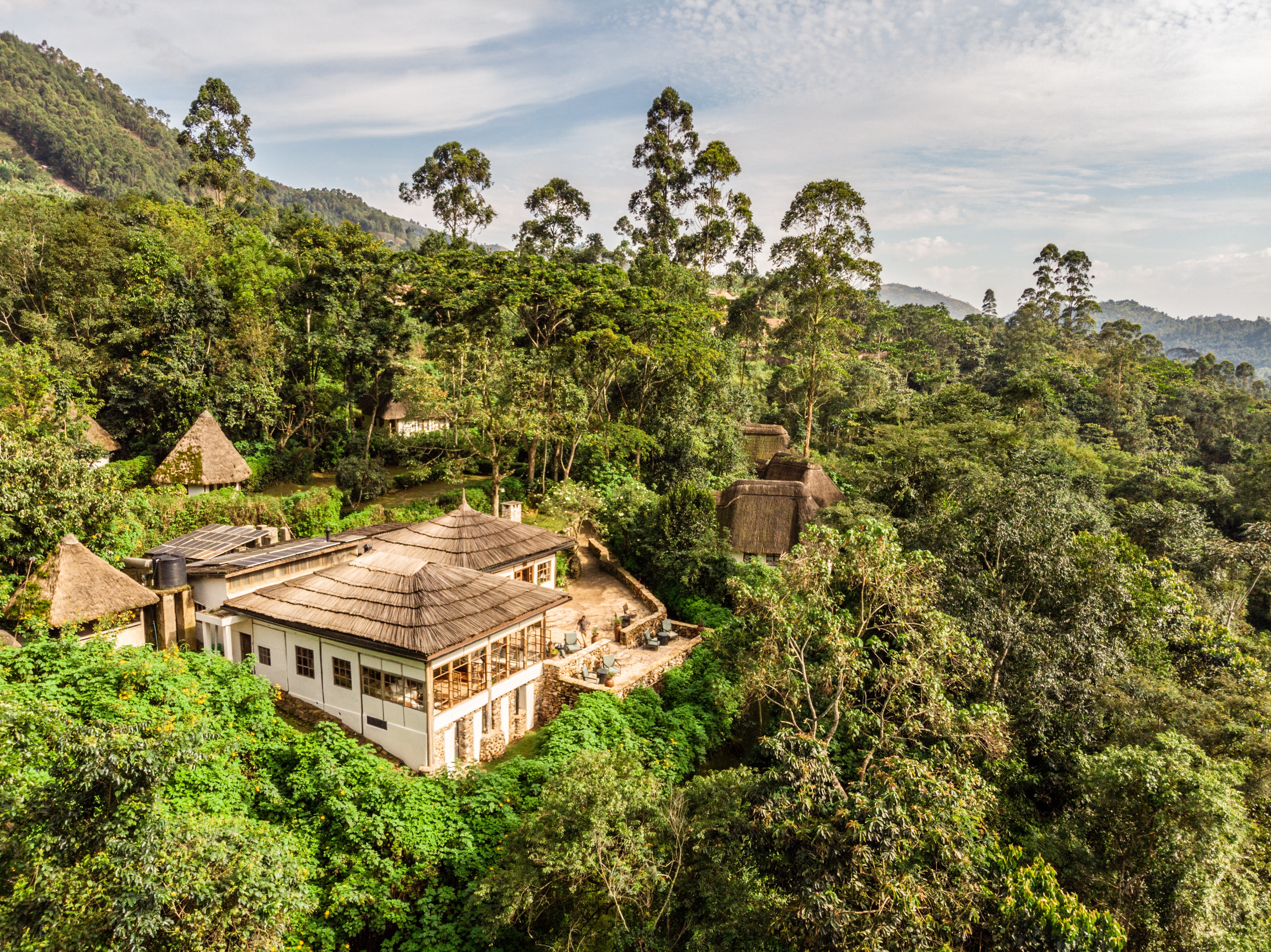 Aerial view of Volcanoes Safaris Eco Lodge in Bwindi Impenetrable Forest, Uganda
Aerial view of Volcanoes Safaris Eco Lodge in Bwindi Impenetrable Forest, Uganda -
Origins Lodge (Costa Rica):
- A luxury eco tourism lodge focused on wellness and gastronomy in the Costa Rican jungle.
- Implements sustainable practices like a 100% ecological water system and local food production.
- Initiatives: Features a 100% ecological water system without energy usage, produces its own honey, fruits, vegetables, cheese, and milk.
- Practices: Plants around 500 native trees every year to aid reforestation and provide food for local wildlife.
- Focus: Wellness, gastronomy, and hiking volcanoes.
- Best For: Wellness, gastronomy, and hiking volcanoes.
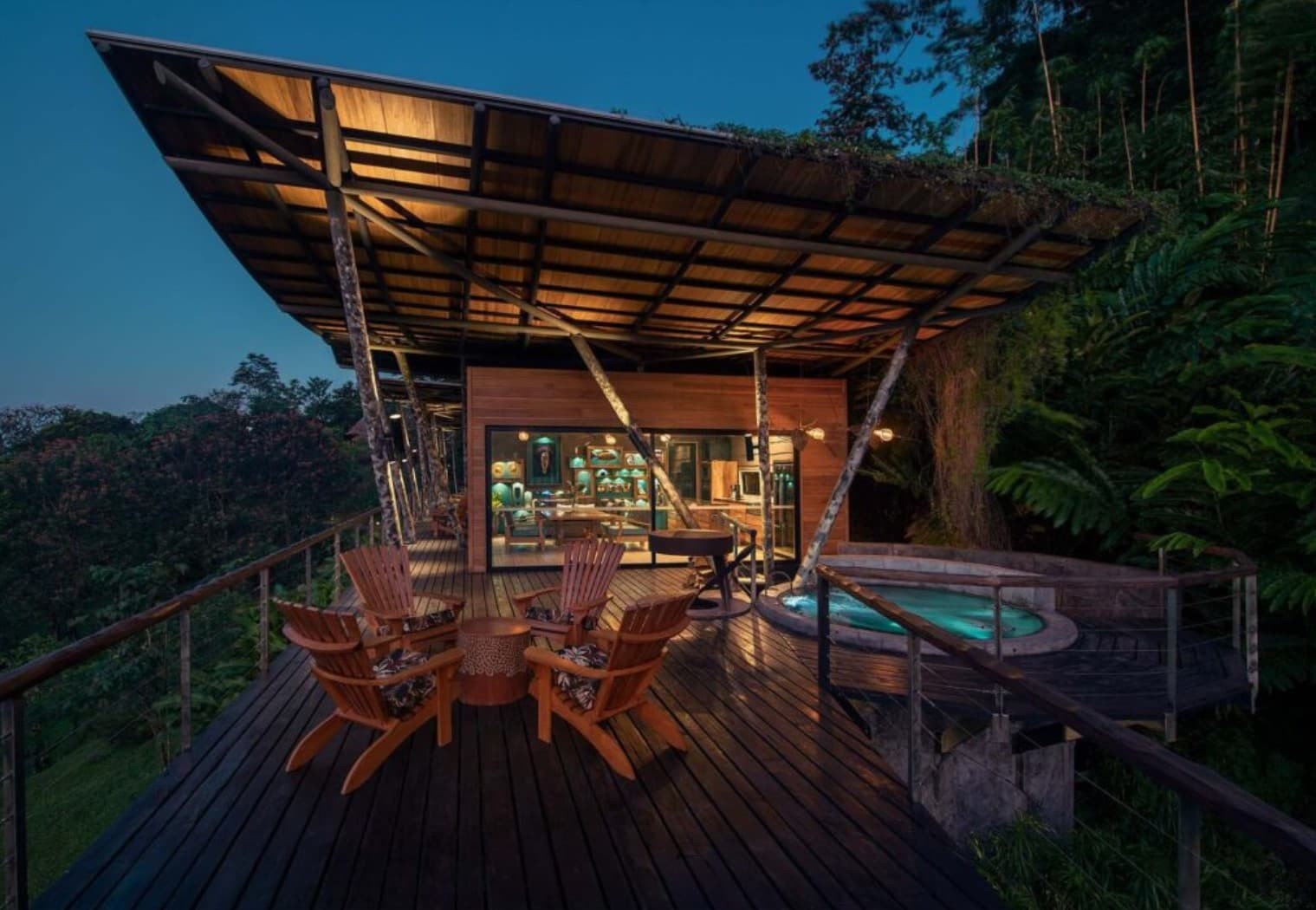 Origins lodge
Origins lodge -
Gili Lankanfushi (Maldives):
- Offers sustainably built rustic-luxe villas over crystal-clear turquoise waters.
- Utilizes local resources and minimizes plastic usage.
- Practices: Uses organic toiletries in refillable containers and minimizes plastic usage. Features a desalination plant for water.
- Activities: Coral cleaning adventures and underwater data collection for scientific organizations.
- Focus: Sustainable practices, utilizing local resources, and engaging in marine conservation.
- Best For: Romance and Honeymoon.
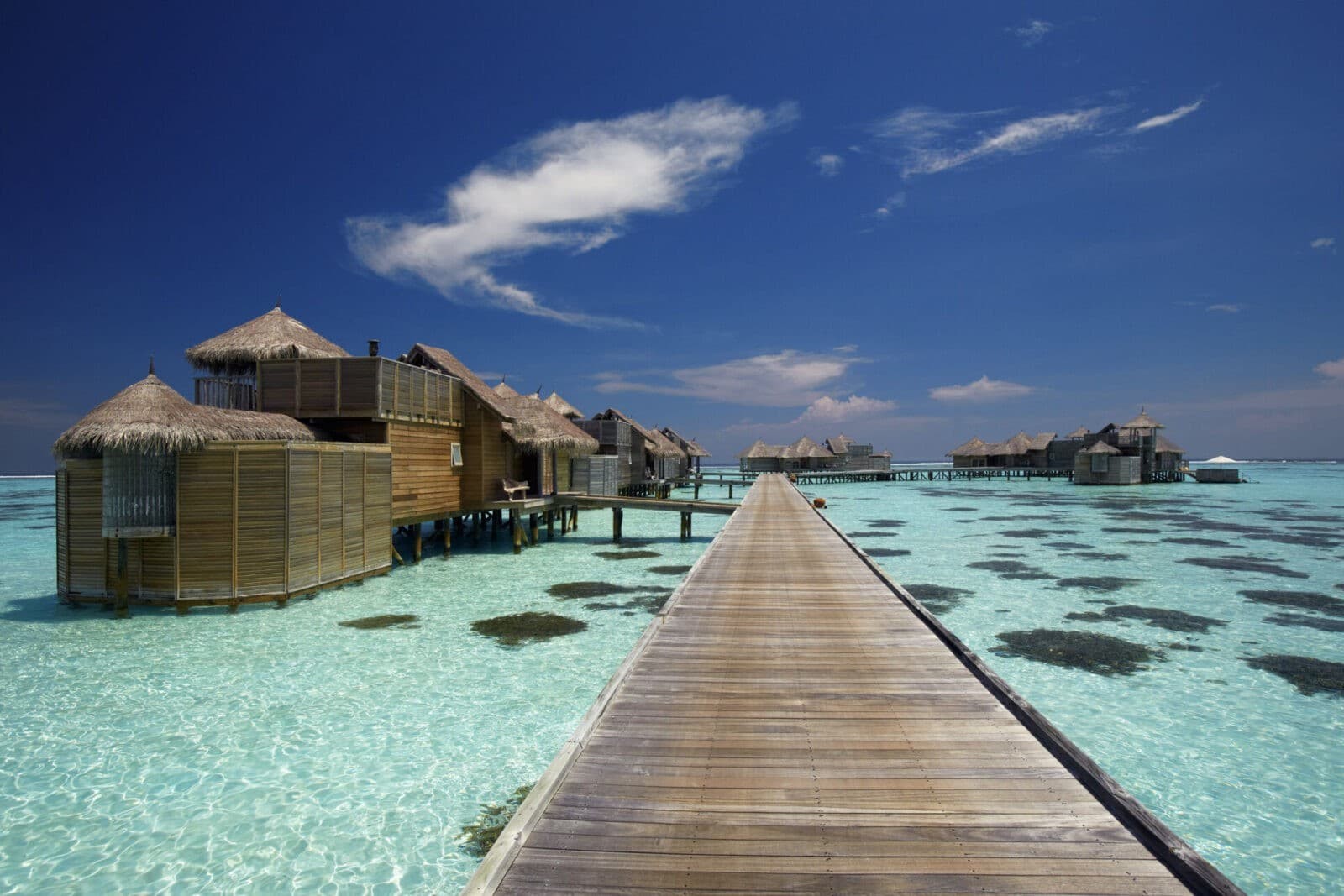 16_HD_GLM_Jetty-2
16_HD_GLM_Jetty-2 -
Christalino Lodge (Amazon Rainforest, Brazil):
- Located deep within the Amazon jungle, promoting total immersion in nature and protecting local indigenous inhabitants.
- Involved in education about the Amazon ecosystem and offers nature tours led by expert guides.
- Practices: Offers nature tours led by expert guides and workshops in wildlife photography.
- Focus: Rainforest education, birding, and protecting the local indigenous inhabitants.
- Best For: Rainforest education and birding.
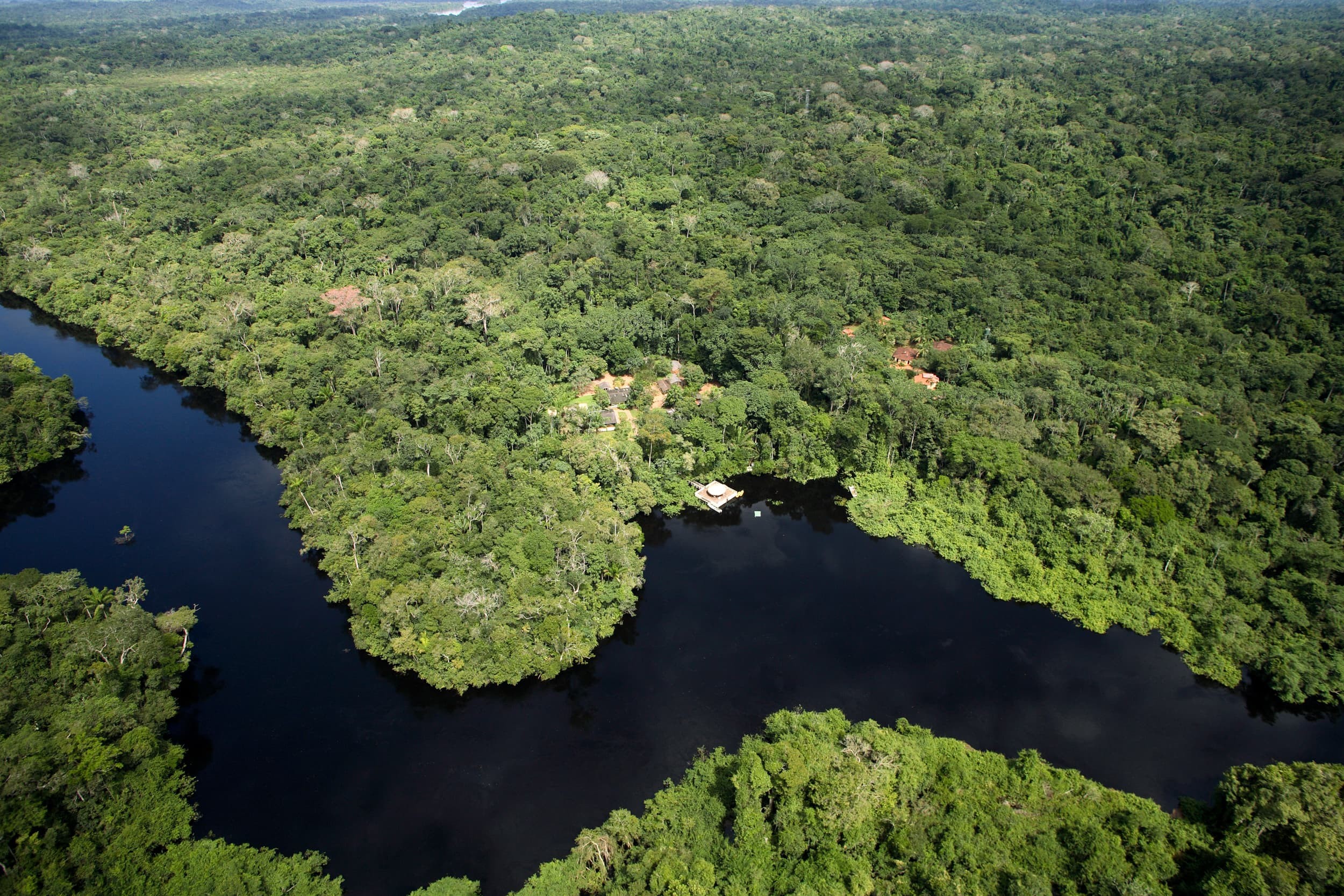 Aerial view-By-Edson Endrigo
Aerial view-By-Edson Endrigo -
Capella Lodge (Lord Howe Island, Australia):
- Located on a UNESCO World Heritage island, known for unique flora, fauna, and wildlife.
- Offers luxury in harmony with ecotourism.
- Focus: UNESCO World Heritage protected areas and natural attractions, including rainforests, mountain hiking, and pristine beaches.
- Best For: UNESCO World Heritage protected areas.
 Deck view of Lord Howe Island and mountains and sea from Capella eco lodge
Deck view of Lord Howe Island and mountains and sea from Capella eco lodge
These lodges represent a commitment to sustainability, offering travelers unique and responsible experiences.
7. What Role Do Eco Tourism Lodges Play in Community Development?
Eco tourism lodges play a crucial role in community development by providing employment opportunities, supporting local businesses, and promoting cultural preservation. According to a study by the International Ecotourism Society (TIES), eco tourism lodges often prioritize hiring local staff, purchasing local products, and supporting community projects. By investing in local communities, eco tourism lodges contribute to sustainable development and improve the quality of life for residents.
Enhancing Community Well-being:
- Employment Opportunities: Eco tourism lodges offer jobs to local residents, providing income and skills development.
- Support for Local Businesses: Purchasing goods and services from local businesses stimulates the local economy.
- Cultural Preservation: Eco tourism lodges promote and preserve local cultures and traditions through cultural tours, performances, and crafts.
- Community Projects: Supporting community projects such as schools, healthcare facilities, and infrastructure development.
- Education and Training: Providing education and training programs to enhance the skills and knowledge of local residents.
Through these initiatives, eco tourism lodges help build stronger, more resilient communities.
8. How Can Eco Tourism Lodges Contribute to Environmental Conservation?
Eco tourism lodges contribute to environmental conservation through various practices, including reducing waste, conserving water, and protecting biodiversity. They often engage in reforestation projects, wildlife protection programs, and habitat restoration. By minimizing their environmental footprint and actively participating in conservation efforts, eco tourism lodges help protect the planet’s natural resources.
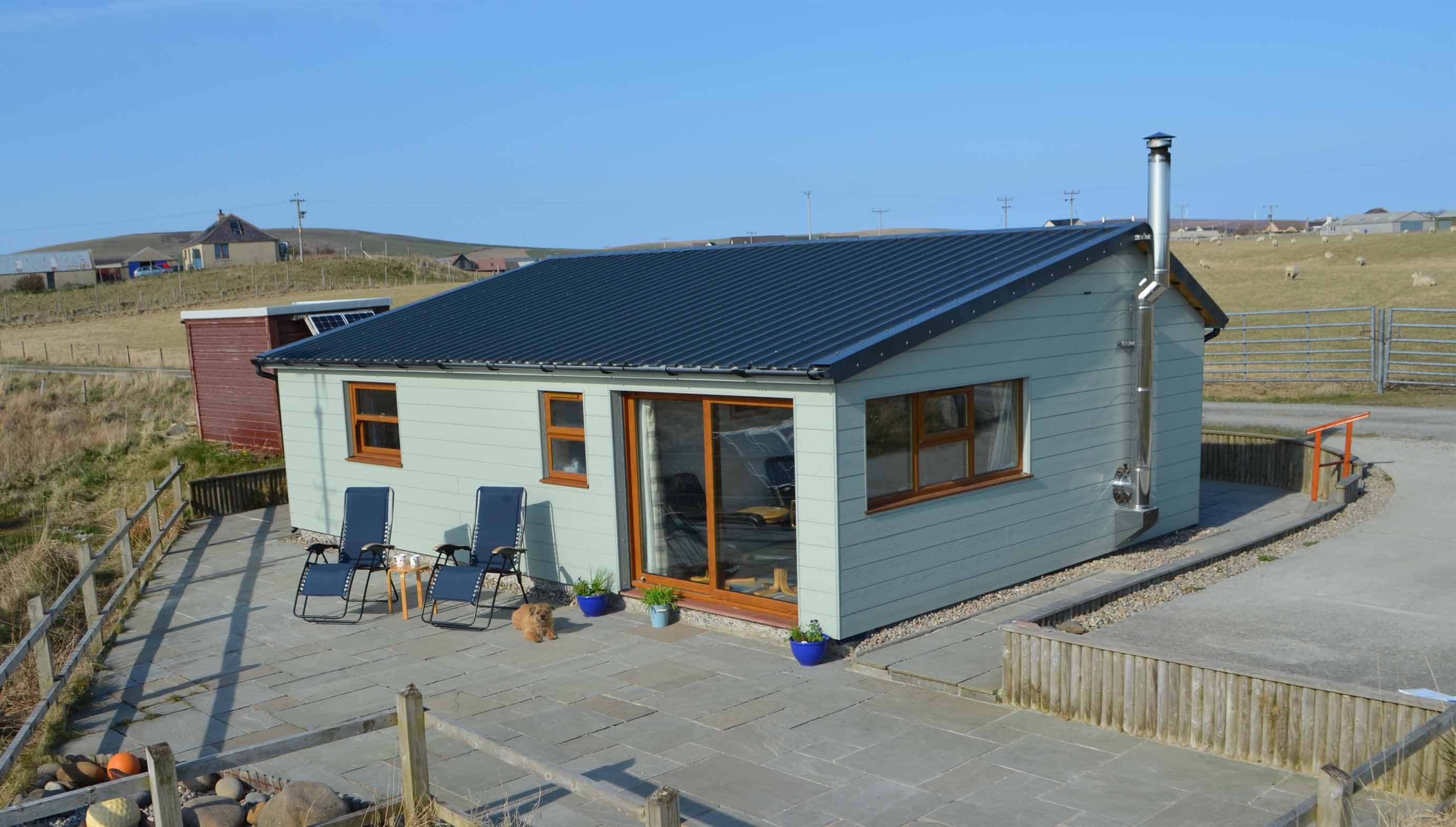 Small sustainable eco cottage in the countryside of the Orkney Islands, UK
Small sustainable eco cottage in the countryside of the Orkney Islands, UK
Conservation Initiatives:
- Waste Reduction: Implementing recycling programs, reducing single-use plastics, and promoting reusable items.
- Water Conservation: Using water-efficient fixtures, collecting rainwater, and managing water resources sustainably.
- Energy Efficiency: Utilizing renewable energy sources, such as solar power, and implementing energy-efficient technologies.
- Biodiversity Protection: Protecting local flora and fauna through conservation programs, habitat restoration, and wildlife monitoring.
- Reforestation: Planting trees to restore forests, sequester carbon, and provide habitat for wildlife.
By focusing on these initiatives, eco tourism lodges play a vital role in preserving natural environments for future generations.
9. What are the Benefits of Choosing an Eco Tourism Lodge for My Vacation?
Choosing an eco tourism lodge for your vacation offers numerous benefits, including minimizing your environmental impact, supporting local communities, and experiencing unique and authentic travel experiences. Eco tourism lodges provide opportunities to connect with nature, learn about local cultures, and contribute to conservation efforts. By opting for sustainable accommodations, you can enjoy a guilt-free vacation that benefits both the planet and its people.
Why Choose an Eco Tourism Lodge?
-
Environmental Responsibility: Reduce your carbon footprint and support conservation efforts.
-
Community Support: Contribute to local economies and support community development projects.
-
Authentic Experiences: Immerse yourself in local cultures and connect with nature.
-
Educational Opportunities: Learn about environmental issues and sustainable practices.
-
Unique Accommodations: Enjoy unique and eco-friendly accommodations that blend seamlessly with the environment.
By choosing an eco tourism lodge, you can make a positive impact while enjoying an unforgettable vacation.
10. How Can SIXT.VN Help Me Find the Perfect Eco Tourism Lodge in Vietnam?
SIXT.VN offers a range of services to help you find and book the perfect eco tourism lodge in Vietnam. We provide personalized travel consulting, hotel booking assistance, and customized tour packages that focus on sustainable tourism. Whether you are looking for a tranquil retreat in the mountains or a beachfront eco-resort, SIXT.VN can help you plan a responsible and rewarding vacation.
SIXT.VN’s Eco Tourism Services:
- Travel Consulting: Personalized advice to help you choose the best eco tourism lodge based on your preferences and budget.
- Hotel Booking: Assistance with booking eco-friendly accommodations that meet your needs.
- Customized Tours: Tailored tour packages that incorporate sustainable tourism practices and support local communities.
- Airport Transfers: Convenient and eco-friendly airport transfer services to and from your eco tourism lodge.
- Local Experiences: Recommendations for authentic local experiences that promote cultural preservation and environmental awareness.
With SIXT.VN, you can easily plan a sustainable and memorable trip to Vietnam, knowing that you are making a positive impact on the environment and local communities.
11. What are the Most Eco-Friendly Regions in Vietnam to Visit?
Vietnam offers several eco-friendly regions that are perfect for sustainable travel. These include destinations like Cuc Phuong National Park, Sapa, and the Mekong Delta. According to the Vietnam National Administration of Tourism, these regions offer a variety of eco tourism activities, such as hiking, bird-watching, and cultural immersion programs.
Vietnam’s Eco Tourism Hotspots:
-
Cuc Phuong National Park:
- Known for its biodiversity and conservation efforts.
- Offers hiking trails, wildlife viewing, and opportunities to learn about local flora and fauna.
-
Sapa:
- Home to ethnic minority communities and stunning mountain landscapes.
- Features community-based tourism initiatives, eco-lodges, and trekking tours that support local economies.
-
Mekong Delta:
- A region of lush landscapes, vibrant markets, and traditional farming practices.
- Offers boat tours, homestays, and opportunities to experience local culture sustainably.
-
Pu Luong Nature Reserve:
- Offers stunning landscapes, diverse flora and fauna, and opportunities to explore traditional Thai villages.
- Perfect for hiking, trekking, and experiencing rural Vietnamese culture.
-
Cat Tien National Park:
- One of Vietnam’s largest national parks, known for its rich biodiversity and conservation programs.
- Offers guided tours, wildlife spotting, and opportunities to learn about the park’s ecosystem.
These regions provide a diverse range of eco tourism experiences, ensuring that travelers can find the perfect destination for their sustainable vacation.
12. What Eco Tourism Activities Can I Experience in Vietnam?
In Vietnam, you can experience a variety of eco tourism activities, including hiking in national parks, participating in community-based tourism projects, and visiting sustainable farms. According to TripAdvisor, popular eco tourism activities include trekking in Sapa, exploring the Mekong Delta by boat, and volunteering at conservation centers.
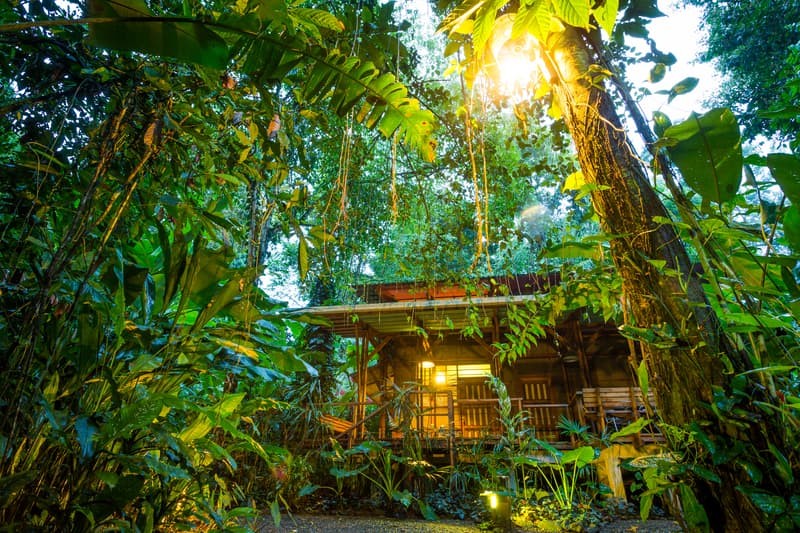 Eco lodge Costa Rica
Eco lodge Costa Rica
Eco Tourism Activities in Vietnam:
-
Hiking in National Parks:
- Explore Vietnam’s diverse landscapes through guided hikes in national parks like Cuc Phuong and Cat Tien.
- Discover unique flora and fauna while supporting conservation efforts.
-
Community-Based Tourism:
- Participate in community-based tourism projects in Sapa and other rural areas.
- Stay in local homestays, learn about traditional crafts, and support local economies.
-
Sustainable Farms:
- Visit sustainable farms in the Mekong Delta and other agricultural regions.
- Learn about organic farming practices, participate in harvesting, and enjoy fresh, locally sourced meals.
-
Bird Watching:
- Engage in bird watching tours in national parks and nature reserves.
- Spot a variety of bird species while contributing to conservation efforts.
-
Kayaking and Boat Tours:
- Explore coastal regions and waterways through kayaking and boat tours.
- Discover hidden gems while minimizing your environmental impact.
These activities provide opportunities to connect with nature, learn about local cultures, and support sustainable tourism in Vietnam.
13. How Can I Get Involved in Conservation Efforts During My Trip?
You can get involved in conservation efforts during your trip by volunteering at local conservation centers, participating in reforestation projects, and supporting eco-friendly businesses. Many organizations in Vietnam offer opportunities for tourists to contribute to conservation efforts.
Ways to Contribute to Conservation:
-
Volunteering:
- Volunteer at local conservation centers that protect endangered species and ecosystems.
- Participate in wildlife monitoring, habitat restoration, and educational programs.
-
Reforestation Projects:
- Join reforestation projects to plant trees and restore forests.
- Help sequester carbon, enhance biodiversity, and support local communities.
-
Supporting Eco-Friendly Businesses:
- Choose eco-friendly accommodations, restaurants, and tour operators.
- Support businesses that prioritize sustainability, local sourcing, and community engagement.
-
Donations:
- Donate to local conservation organizations that are working to protect Vietnam’s natural heritage.
- Support projects that focus on wildlife protection, habitat restoration, and environmental education.
By actively participating in conservation efforts, you can make a positive impact on Vietnam’s environment and contribute to a more sustainable future.
14. What Should I Pack for an Eco-Friendly Trip to Vietnam?
When packing for an eco-friendly trip to Vietnam, prioritize items that minimize waste and support sustainability. Pack reusable water bottles, reusable shopping bags, and eco-friendly toiletries.
Essential Eco-Friendly Packing List:
-
Reusable Water Bottle:
- Avoid single-use plastic bottles by bringing a reusable water bottle.
- Refill it at water stations or filtered water sources throughout Vietnam.
-
Reusable Shopping Bag:
- Reduce plastic waste by bringing a reusable shopping bag for groceries and souvenirs.
- Opt for lightweight and foldable bags that are easy to carry.
-
Eco-Friendly Toiletries:
- Pack eco-friendly shampoo, conditioner, and soap in refillable containers.
- Choose biodegradable and cruelty-free products that minimize environmental impact.
-
Reusable Food Containers:
- Bring reusable food containers for taking leftovers or packing snacks.
- Reduce reliance on disposable containers and packaging.
-
Rechargeable Batteries and Solar Chargers:
- Use rechargeable batteries for electronic devices and bring a solar charger for backup power.
- Minimize waste and reduce reliance on disposable batteries.
By packing these eco-friendly essentials, you can reduce your environmental footprint and support sustainable practices during your trip to Vietnam.
15. How Can I Ensure a Sustainable Travel Experience with SIXT.VN?
To ensure a sustainable travel experience with SIXT.VN, choose eco-friendly transportation options, accommodations, and tour packages. SIXT.VN is committed to promoting responsible tourism and offers a range of services to help you minimize your environmental impact.
SIXT.VN’s Sustainable Travel Practices:
-
Eco-Friendly Transportation:
- Opt for hybrid or electric vehicles for airport transfers and transportation.
- Use public transportation or bicycle rentals to explore cities and regions.
-
Eco Tourism Accommodations:
- Choose eco tourism lodges and hotels that prioritize sustainability.
- Look for accommodations with certifications like LEED or EarthCheck.
-
Sustainable Tour Packages:
- Select tour packages that focus on responsible tourism practices.
- Support local communities, protect natural resources, and promote cultural preservation.
-
Carbon Offset Programs:
- Participate in carbon offset programs to compensate for the environmental impact of your flights and transportation.
- Support projects that reduce greenhouse gas emissions and promote renewable energy.
-
Responsible Travel Tips:
- Follow responsible travel tips to minimize your environmental footprint.
- Respect local cultures, conserve water and energy, and reduce waste.
By choosing SIXT.VN, you can enjoy a sustainable and memorable travel experience in Vietnam, knowing that you are contributing to a better future for the planet and its people.
FAQ: Eco Tourism Lodges
-
What exactly is an eco tourism lodge?
An eco tourism lodge is an accommodation designed to minimize environmental impact and support local communities. -
How do eco tourism lodges help the environment?
They reduce waste, conserve water and energy, and protect biodiversity through various sustainable practices. -
Are eco tourism lodges more expensive than regular hotels?
While some may be, many eco tourism lodges offer competitive pricing and added value through unique experiences. -
Can I find eco tourism lodges suitable for families?
Yes, many eco tourism lodges cater to families, offering activities and amenities for all ages. -
How can I verify if a lodge is truly eco-friendly?
Look for certifications like LEED or EarthCheck, and check their sustainability policies and community involvement. -
What type of activities do eco tourism lodges typically offer?
Activities often include hiking, bird-watching, cultural tours, and volunteering in conservation projects. -
Do eco tourism lodges support local communities?
Yes, they often hire local staff, purchase local products, and support community projects. -
Is eco tourism only for nature enthusiasts?
No, eco tourism offers diverse experiences that cater to various interests, including culture and history. -
How can I reduce my carbon footprint while staying at an eco tourism lodge?
Use public transport, participate in carbon offset programs, and conserve water and energy. -
Can SIXT.VN help me plan an eco-friendly trip to Vietnam?
Yes, SIXT.VN offers personalized travel consulting, eco-friendly accommodations, and sustainable tour packages.
Ready to experience the beauty of Vietnam sustainably? Contact SIXT.VN today to plan your unforgettable eco tourism adventure!
Address: 260 Cau Giay, Hanoi, Vietnam
Hotline/Whatsapp: +84 986 244 358
Website: SIXT.VN



